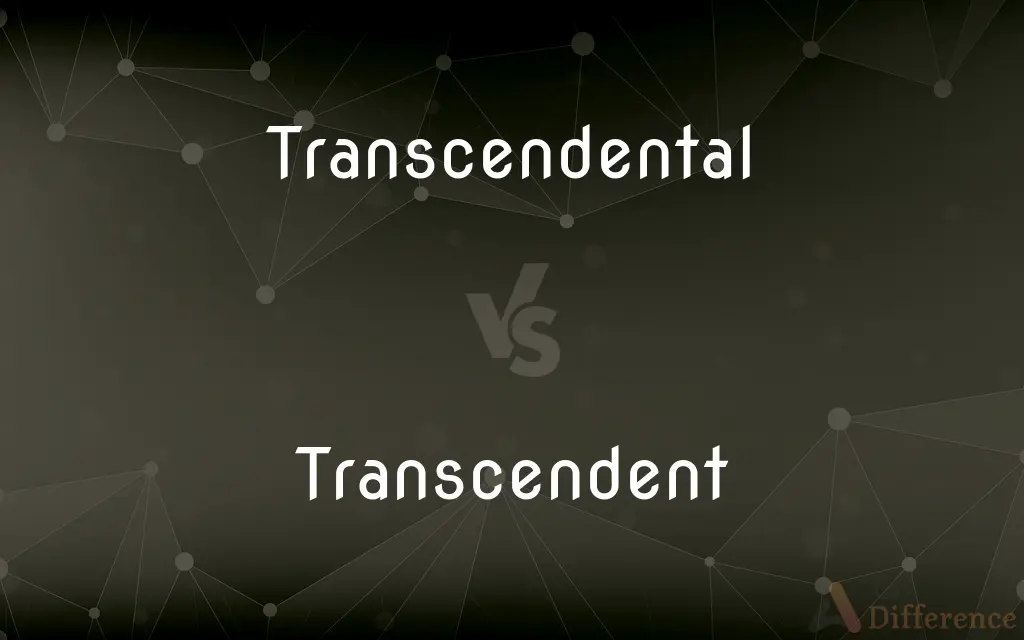Transcendental vs. Transcendent — What's the Difference?
By Fiza Rafique & Urooj Arif — Updated on March 25, 2024
Transcendental refers to knowledge or philosophy beyond empirical experience, whereas transcendent signifies surpassing usual limits.

Difference Between Transcendental and Transcendent
Table of Contents
ADVERTISEMENT
Key Differences
Transcendental philosophy emphasizes knowledge that exists beyond and above empirical observation, grounding itself in the concept that certain principles or knowledge are inherent and not derived from experience. On the other hand, transcendent is often used to describe an experience, entity, or aspect of reality that goes beyond or above the range of normal human experience, suggesting something that is not just beyond ordinary but surpasses established boundaries or limits.
Transcendental ideas often relate to the a priori, or what can be known through intuition or understanding without empirical evidence, suggesting a foundation of knowledge that exists independently of the material world. Transcendent, however, conveys a quality of being that exceeds physical existence or the ordinary limitations of human perception, often associated with the divine or the supernatural.
In the realm of philosophy, transcendental approaches are closely associated with Immanuel Kant, who posited that certain concepts (like space and time) are a priori conditions of human sensibility. These conditions make experiences possible and are not derived from the experiences themselves. Transcendent, by contrast, is a term that might be applied more broadly in religious, spiritual, or metaphysical contexts to denote that which lies beyond the known or observable universe.
Transcendental methodologies often seek to explore the conditions that make knowledge possible, focusing on the structures of consciousness and perception that precede empirical data. In contrast, transcendent notions frequently encourage looking beyond the tangible world to understand or connect with the underlying or overarching essence of existence.
While transcendental perspectives provide a framework for understanding how human cognition interacts with the world in a pre-experiential way, transcendent concepts challenge us to acknowledge and engage with aspects of reality that defy empirical explanation, often leading to a sense of awe or spiritual elevation.
ADVERTISEMENT
Comparison Chart
Definition
Pertaining to knowledge beyond empirical experience.
Surpassing usual physical or empirical limits.
Associated Fields
Philosophy, particularly of Immanuel Kant.
Religion, spirituality, metaphysics.
Key Concepts
A priori knowledge, conditions of possibility.
Beyond human perception, supernatural, divine.
Philosophical Focus
Conditions and structures that make experience possible.
Experiences or entities that lie beyond observable universe.
Usage Context
Often used in discussing the nature of knowledge and reality.
Commonly referenced in spiritual, religious, or metaphysical contexts.
Compare with Definitions
Transcendental
Relating to knowledge or philosophical systems that are beyond sensory experience.
Kant's critique is a foundation of transcendental philosophy.
Transcendent
Exceeding or surpassing the ordinary limits of human experience.
Many have described the beauty of the Grand Canyon as transcendent.
Transcendental
Concerning a priori conditions necessary for human understanding.
Transcendental arguments often involve discussing the prerequisites for experience or knowledge.
Transcendent
Relating to the aspect of God's nature that is wholly independent of the material universe.
The transcendent aspect of the divine is beyond human comprehension.
Transcendental
Involving concepts that are not derived from empirical observation.
The idea of transcendental freedom posits free will as a necessary condition of moral responsibility.
Transcendent
Beyond or above the range of normal or merely physical human experience.
Certain moments in life feel transcendent, lifting us out of the mundane.
Transcendental
Pertaining to methods or approaches that aim to uncover the underlying conditions of phenomena.
Transcendental meditation seeks to transcend ordinary states of consciousness.
Transcendent
Surpassing the ordinary; exceptional.
His transcendent performance set a new standard for ballet dancers.
Transcendental
Associated with the idea that some truths exist independently of sensory experience.
Some mathematicians view numbers as transcendental truths.
Transcendent
In philosophy, denoting an experience that goes beyond physical being.
The concept of transcendent reality challenges materialist perspectives.
Transcendental
Concerned with the a priori or intuitive basis of knowledge as independent of experience.
Transcendent
Beyond or above the range of normal or physical human experience
The search for a transcendent level of knowledge
Transcendental
Asserting a fundamental irrationality or supernatural element in experience.
Transcendent
(in scholastic philosophy) higher than or not included in any of Aristotle's ten categories.
Transcendental
Surpassing all others; superior.
Transcendent
Surpassing others; preeminent or supreme.
Transcendental
Beyond common thought or experience; mystical or supernatural.
Transcendent
Lying beyond the ordinary range of perception
"fails to achieve a transcendent significance in suffering and squalor" (National Review).
Transcendental
(Mathematics) Of or relating to a real or complex number that is not the root of any polynomial that has positive degree and rational coefficients.
Transcendent
Transcending the Aristotelian categories.
Transcendental
(obsolete) A transcendentalist.
Transcendent
In Kant's theory of knowledge, being beyond the limits of experience and hence unknowable.
Transcendental
Any one of the three transcendental properties of being: truth, beauty or goodness, which respectively are the ideals of science, art and religion and the principal subjects of the study of logic, aesthetics and ethics.
Transcendent
Being above and independent of the material universe. Used of the Deity.
Transcendental
(philosophy) Concerned with the a priori or intuitive basis of knowledge, independent of experience.
Transcendent
Surpassing usual limits
Transcendental
Superior; surpassing all others; extraordinary; transcendent.
Transcendent
Supreme in excellence
Transcendental
Mystical or supernatural.
Transcendent
Beyond the range of usual perception
Transcendental
Not algebraic (i.e., not the root of any polynomial that has positive degree and rational coefficients).
Transcendent
Free from constraints of the material world
Transcendental
That contains elements that are not algebraic.
Transcendent
That which surpasses or is supereminent; something excellent.
Transcendental
Supereminent; surpassing others; as, transcendental being or qualities.
Transcendent
Very excellent; superior or supreme in excellence; surpassing others; as, transcendent worth; transcendent valor.
Clothed with transcendent brightness.
Transcendental
In the Kantian system, of or pertaining to that which can be determined a priori in regard to the fundamental principles of all human knowledge. What is transcendental, therefore, transcends empiricism; but is does not transcend all human knowledge, or become transcendent. It simply signifies the a priori or necessary conditions of experience which, though affording the conditions of experience, transcend the sphere of that contingent knowledge which is acquired by experience.
Transcendent
Transcending, or reaching beyond, the limits of human knowledge; - applied to affirmations and speculations concerning what lies beyond the reach of the human intellect.
Transcendental
Vaguely and ambitiously extravagant in speculation, imagery, or diction.
Transcendent
That which surpasses or is supereminent; that which is very excellent.
Transcendental
A transcendentalist.
Transcendent
Beyond and outside the ordinary range of human experience or understanding;
Philosophers...often explicitly reject the notion of any transcendent reality beyond thought...and claim to be concerned only with thought itself...
The unknowable mysteries of lifer
Transcendental
Existing outside of or not in accordance with nature;
Find transcendental motives for sublunary action
Transcendent
Exceeding or surpassing usual limits especially in excellence
Transcendental
Of or characteristic of a system of philosophy emphasizing the intuitive and spiritual about the empirical and material
Common Curiosities
How do transcendental ideas impact understanding of reality?
They suggest that our grasp of reality is shaped by conditions and structures inherent to human cognition, not just by sensory experience.
What is meant by transcendent?
Transcendent describes anything that surpasses the normal limits of physical existence or human experience, often implying a divine or supernatural aspect.
How do transcendental and transcendent differ in philosophy?
Transcendental philosophy focuses on the foundational conditions of knowledge and experience, whereas transcendent philosophy often deals with what lies beyond the physical or empirical world.
Can something be both transcendental and transcendent?
Yes, in certain contexts, an idea or experience could be considered both transcendental in its foundation beyond empirical evidence and transcendent in its surpassing of ordinary human understanding.
How do transcendental arguments work?
Transcendental arguments begin with a given experience then deduce the conditions necessary for such an experience to be possible, aiming to establish certain knowledge claims.
Why is transcendentalism important in literature?
Transcendentalism in literature emphasizes intuition, nature, and the inherent goodness of individuals, challenging established norms and encouraging self-reliance.
Is transcendence a religious concept?
While transcendent is often used in religious or spiritual contexts, the concept itself can apply to any experience or entity that goes beyond the ordinary, including secular experiences of awe.
Do transcendent entities exist?
Whether transcendent entities exist is a matter of philosophical and theological debate, dependent on one’s worldview or religious beliefs.
What does transcendental mean?
Transcendental refers to knowledge or philosophy that operates beyond the realm of sensory experience, focusing on a priori conditions of human understanding.
Can transcendent experiences be explained scientifically?
Transcendent experiences, by their nature, often defy empirical explanation, although science may explore their psychological or neurological dimensions.
Are transcendental numbers related to transcendental philosophy?
While both terms involve the concept of transcending, transcendental numbers refer specifically to numbers that are not roots of any algebraic equation with rational coefficients, not philosophical concepts.
Can transcendent experiences be shared or communicated?
While transcendent experiences are deeply personal, aspects of them can often be shared or communicated through art, literature, or religious practice, albeit imperfectly.
What makes knowledge transcendental?
Knowledge is transcendental if it is considered to be independent of sensory experience and inherent to the cognitive structures of the mind.
How is transcendental meditation different from other forms?
It focuses on transcending thought to reach a state of pure consciousness, unlike other forms that may focus on mindfulness or concentration on objects.
What role does the transcendent play in art?
The transcendent in art refers to works that evoke a sense of something beyond the tangible world, inspiring a feeling of awe or spiritual connection.
Share Your Discovery

Previous Comparison
Anybody vs. Nobody
Next Comparison
Collaborative vs. ConfrontationalAuthor Spotlight
Written by
Fiza RafiqueFiza Rafique is a skilled content writer at AskDifference.com, where she meticulously refines and enhances written pieces. Drawing from her vast editorial expertise, Fiza ensures clarity, accuracy, and precision in every article. Passionate about language, she continually seeks to elevate the quality of content for readers worldwide.
Co-written by
Urooj ArifUrooj is a skilled content writer at Ask Difference, known for her exceptional ability to simplify complex topics into engaging and informative content. With a passion for research and a flair for clear, concise writing, she consistently delivers articles that resonate with our diverse audience.














































